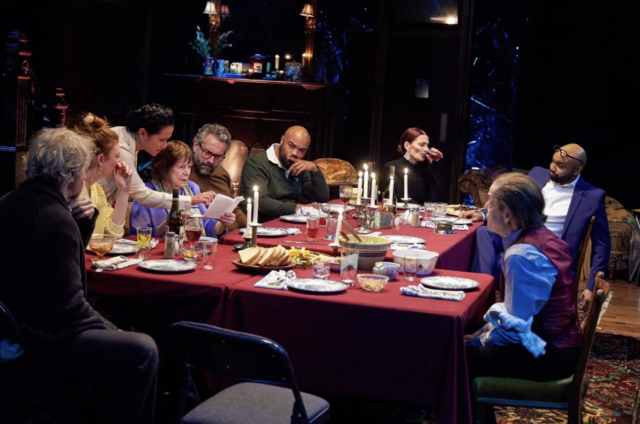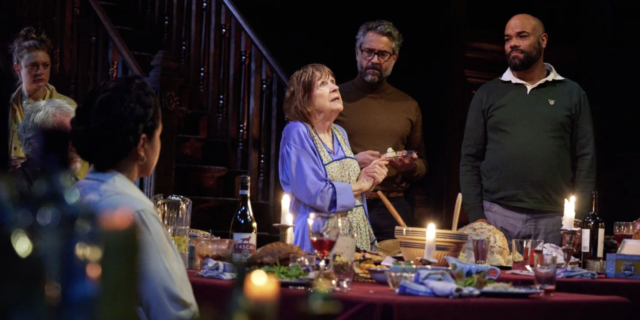
Brian Watkins’s Epiphany takes place at an awkward dinner party (photo by Jeremy Daniel)
EPIPHANY
Lincoln Center Theater at the Mitzi E. Newhouse
150 West 65th St. between Broadway & Amsterdam Ave.
Tuesday – Sunday through July 24, $92
212-362-7600
www.lct.org
In Brian Watkins’s Epiphany, continuing at Lincoln Center’s Mitzi E. Newhouse Theater through July 24, Aran (Carmen Zilles) reads from a letter to guests at a dinner party, “‘A new generation is growing up in our midst, a generation actuated by new ideas and new principles. But we are living in a special . . . ’ — sorry — “‘we are living in a skeptical and, if I may use the phrase, a thought-tormented age: and sometimes I fear that this new generation, educated as it is, will lack those qualities of humanity, of hospitality, of kindly humour which belonged to an older day. It seems to me, I must confess, that we were living in a less spacious age.’ No, that’s not right: ‘that we are living in a less spacious age.’ Well, I can’t tell if it says are or were.”
The quote is taken nearly verbatim from James Joyce’s 1914 short story “The Dead,” which served as inspiration for Watkins’s play. But Watkins and director Tyne Rafaeli transport the tale, which also takes place at a dinner party, to modern times; in fact, though it premiered in 2019 in Ireland, the plot has been tweaked to comment on how the Covid-19 pandemic impacted the way humans relate to one another in what may or may not be a less spacious age.
Morkan (a sensational Marylouise Burke) is a woman of a certain age who has invited a diverse group of people to a dinner party celebrating the epiphany: Freddy (C. J. Wilson), a disheveled math teacher whom Morkan is afraid might drink too much; Sam (Omar Metwally), a well-respected psychiatrist, and his partner, the younger Taylor (David Ryan Smith), who is in marketing; a second couple, lawyer Charlie (Francois Battiste) and pianist Kelly (Heather Burns); Ames (Jonathan Hadary), one of Morkan’s oldest and dearest friends; and Gabriel, Morkan’s nephew and a famous writer who has promised to present a new work and is the main reason everyone has trudged through a snowstorm to come to the party at Morkan’s large country house outside an unidentified major city. Morkan has asked the twentysomething Loren (Colby Minifie) to help her with the food and drinks.
While they’re waiting for Gabriel, Morkan tells them that they have to surrender their phones — she refers to them as “thingamajigs” — and puts them in a box that is tantalizingly close. The guests, none of whom is well acquainted with anyone other than Morkan and the person they came with, are instantly rattled, acting as if a part of their body has been temporarily removed. They feel even more uncomfortable after it becomes evident that no one read any of the attachments Morkan included with the invitation, so they’re not prepared for all the activities she has planned, and they don’t know how to tell her. In addition, no one, including Morkan, knows what the word epiphany means or refers to.

Marylouise Burke is sensational as a dinner party host forced to improvise (photo by Jeremy Daniel)
Charlie: Where did the whole celebration idea come from anyway?
Morkan: Well, that’s the question! I actually have very little idea of what epiphany actually is.
Loren: Oh. I thought this was part of your religion or something.
Morkan: Oh no no no, not at all, it’s just sort of a new curiosity, because . . . well, it’s been an odd twelve months. . . . I’m really so forgetful these days, which is why Gabriel is going to do a whole . . . overview thingy and give a speech with the history and all the answers to the whole yadda yadda.
Taylor: Of course he is.
Kelly: Fucking . . . brilliant man.
Morkan: But so, ok, show of hands, who has celebrated Epiphany?
Kelly: Like the idea? The idea I guess, privately, yes — the what? Oh no.
Morkan: The holiday. The holiday. Show of hands for the holiday.
No one raises their hand.
Morkan: Alright so, before I sent you all the stuff with the invitation . . . who knew what epiphany was?
Kelly: The idea or the holiday?
Morkan: The holiday of Epiphany.
Taylor: The general concept or —
Morkan: The holiday.
Taylor: Oh. No.
Freddy: Not me!
Morkan: Ok. Well. I have no idea what Epiphany is. We have no idea what Epiphany is. But the thing that struck my head was, ya know like . . . creating a tradition . . . How does that work?! Or even just creating a reason, to ya know, get together in a terrible month like January to celebrate life!
As if that weren’t enough, Aran, Gabriel’s partner, soon shows up to explain that Gabriel will not be coming after all, which adds further disappointment and awkwardness. But Morkan is determined to soldier on with music, poetry, intellectual conversation, and the goose she has cooked, leading to some prickly physical and verbal exchanges as the snow keeps falling.
At nearly two hours without intermission, Epiphany is too long, and some of the awkwardness onstage leaks into the audience; at times you might feel like you’re at a dinner party that is going nowhere but you can’t leave. In addition to Joyce, it’s got a bit of Luis Buñuel’s The Discreet Charm of the Bourgeoisie mixed in with Samuel Beckett’s Waiting for Godot, Agatha Christie’s And Then There Were None (without the murders), and the disastrous parties Mary Richards used to throw on The Mary Tyler Moore Show, all of which play with the idea of expectations.
A lot of those expectations have changed significantly since the pandemic lockdown, as people wrestle with who to gather with and where. Gabriel chooses not to go because of a deep depression; it’s not a stretch to think that it may have been caused, at least in part, by the coronavirus crisis and a fear of meeting up with people. I have great friends who still refuse to go to gatherings, whether indoors or outdoors. It can be hard to know when to hug, when to shake hands, when to kiss, and when to bump elbows, which is addressed in Epiphany.
The show also plays with the idea of time, something that was difficult to keep track of during the lockdown and still today, when many of us are working from home. Although the story appears to unfold in something close to real time, Morkan makes several confusing references near the end about how much time has passed that will leave you scratching your head and wondering whether her statements are plain mistakes or have another, not immediately clear meaning.
You’re unlikely to reach any epiphanies while at the Newhouse, but it’s not so bad when you’re spending time with such a terrific cast, comprising some of the city’s finest character actors. Drama Desk winner Burke (Ripcord, Fuddy Meers), in the starring role, is phenomenal, short of stature but long on doddering charm and effervescence, her creaky voice reaching poetic heights. Tony nominee and Obie winner Hadary (Gypsy, As Is) excels as Ames, especially after suffering what could be a serious injury that is handled with slapstick humor. Tony nominee and Obie winner Metwally (Sixteen Wounded, Guards at the Taj) is smooth as silk as the curious neuroscientist. And Minifie (The Boys, Punk Rock), dressed in a yellow outfit that just might have been the old color of the dining room, is wonderful as Loren, who has no idea what she has gotten herself into. (The costumes are by Montana Levi Blanco.)
John Lee Beatty’s set has a gothic charm to it, bar carts and tables hovering close to the audience seated in the first row, who could reach out and grab a drink or snack (but shouldn’t). The snow can be seen through two large windows; mysterious stairs go down to the front door and up to the bedrooms and bathroom, lending the house a ghostly atmosphere. Isabella Byrd’s moody lighting reminds everyone that the storm might knock out the electricity at any second, while Daniel Kluger’s sound often adds a chill to the air.
“Life has just felt so wobbly, so even though I’ve lived here over forty years I feel . . . dislocated . . . exiled, I suppose . . . And I’m not sure why,” Morkan says, essentially speaking for many in the theater. “But maybe that’s the world, I dunno . . . I feel like I’m not making any sense.” Perhaps the same can be said of our “thought-tormented age” itself.